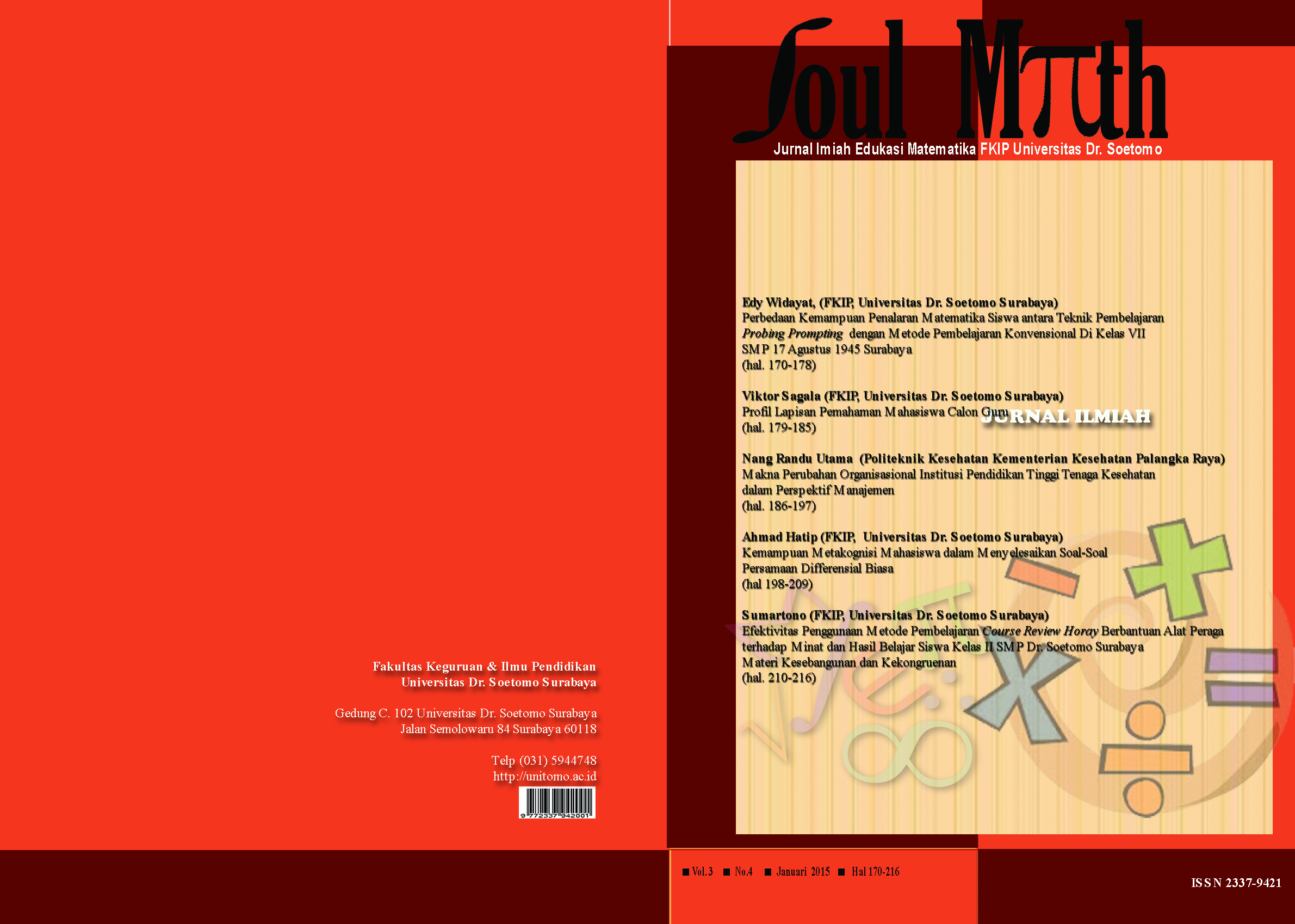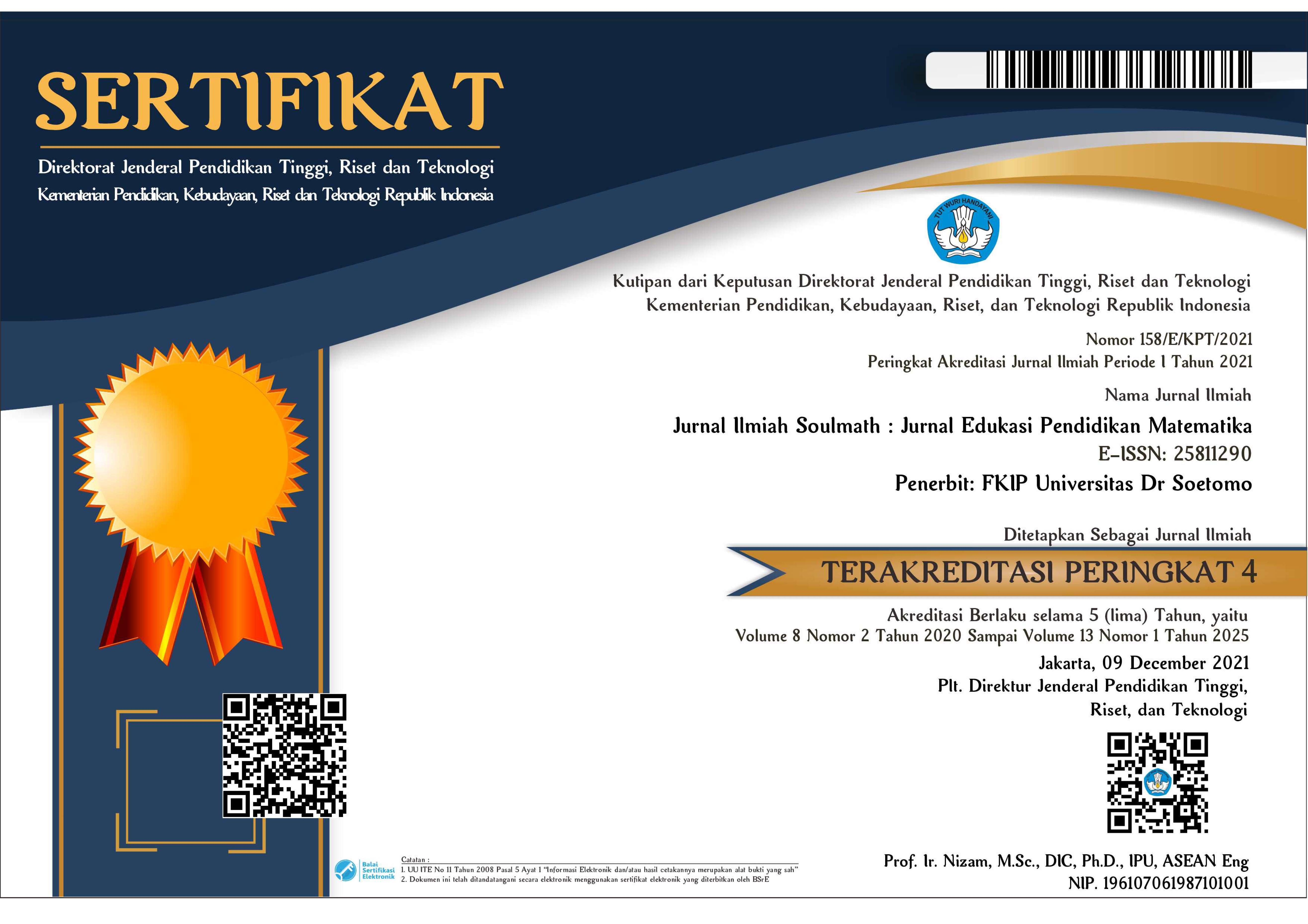KEMAMPUAN METAKOGNISI MAHASISWA DALAM MENYELESAIKAN SOAL-SOAL PERSAMAAN DIFFERENSIAL BIASA
 Abstract views: 406
,
Abstract views: 406
,
 PDF (Bahasa Indonesia) downloads: 562
PDF (Bahasa Indonesia) downloads: 562
Abstract
The process of thinking in problem solving is an important thing to get the attention of educators , especially to assist learners in order to develop a better ability to solve problems in the real-world context and in the context of mathematics . This is in line with the opinion Lester ( in Gartman and Freiberg , 1993) that the main purpose of teaching problem solving in mathematics is not just to equip learners with a set of skills or processes, but rather to enable learners to think for himself. The objective of this study was to describe the student metacognitive level in solving problems of ordinary differential equations. These objectives can be revealed if observed in terms of the process. So that the procedure produces descriptive data in the form of words, written or oral obtained from research subjects. For the purposes of in-depth information that can reveal metacognitive level students, it is necessary informant as much as 3 students selected for an interview based on the ranking score of the mathematics of the test results. Preparation of the rankings are divided into three categories, namely one each student with math scored high, medium, and low. The score category classification using the method of determining the position of the student with a standard deviation based on the reference
Downloads
Download data is not yet available.
References
Anderson,O.W. & Krathwohl, D.R. 2001. A Taxonomy for Learning Teaching, and Assessing (A Revision of Blooms Taxonomy of Educational Objectives), Addision Wesley, Longman, New York.
Blakey, E. & Spence, S. 1990. Developing Metacognition, Clearinghouse on Information Resources Syracusa, New York.
Dawson, Th & Fucher, K 2008, Metacognition and Learning Adulthood, Contemporary Education Psychology, 11, 233-236.
Desoete, A. 2001. off-line metacognition in Children with Mathematics Learning Disabilities, Disertation, Universiteit Gent.
Flavell, J.H. 1976. Metacognition and Cognitive Monitoring, A New Area of Cognitive Developmental Inquiry, American Psychologist, 34, pp.906-911.
Gama, C. 2004. Integrating Metacognition Instruction in Interactive Learning Environment, University of Sussex, http://www. Integrating Metacognition, diakses 15 September, 2006.
Hunter,M (2004), Enhanching Teaching, MacMillan College Publication, Co, New York.
Kayashima,M & Inaba,A. 2007. The Model of Metacognitive Skill and How to Facilitate Development of the Skill, Faculty of Arts and Education, Tamagawa University, Japan
Kelly, R.T. 2006. Teaching Problem Solving, Journal of Research in Mathematics Education, NCTM ,Reston,VA.
Lauren Allen (2010) Rumination and Reflection: An Investigation of Self-focus, Metacognition and Coping Styles in Depression. (Supervisor - Keith Dobson)
Livingston, J.A. 1997. Metacognition: An Overview; available:http:// www.qse.buffalo.edu/fas/schuell/cep564/metacog.htm, diakses, 20 September 2006.
Luis, T. etc. 2006. Thinker-Listener Pair Interactions to Develop Student’s Metacognitive Strategies for Mathematical Problem Solving ,Nanyang Technology University,Singapore.
Marthan, S & Koedinger, K, 2005, Fostering the Intelligent novice: Learning from Error with Metacognitive Tutoring, Educational Psychology, 89(4), 686-695.
Mudzakir, M.D. 1998. Metakognisi Dosen Dalam Proses Pembelajaran, Disertasi, Tidak dipublikasikan. Program PascaSarjana, Universitas Negeri Malang,
Nurdin. 2007, Model Pembelajaran yang Menumbuhkan Kemampuan Metakognitif, Disertasi tidak dipublikasikan, Program Pascasarjana Unesa, Surabaya.
Panoura, A. dkk. 2005. Young Pupil’s Metacognitive Ability In Mathematics, European Research in Mathematics, Departeman Of Education, University of Cyprus,Cyprus.
Schoenfeld, A.1992. Hand Book of Researh on Mathematics Teaching and Learning, Mc Millan Co.New York.
Sjuts, J.L.1999. Metacognition in Mathematics Lessons,. Available : http://www/ web.doc.sub.gwdg.de/book/e/gdm/1999, index.html,pp.76-87, diakses 15 Maret 2006.
Veenman, M, 2006, Metacognition and Learning: Conceptual and Methodological Consideration, Spinger Sciense Book, Co, Netherland.
Yong, H.T.Y. & Kiong, L.N.K. 2006. Metacognitive Aspect of Mathematics Problem Solving, MARA University of Technology Malaysia, Kuala Lumpur
Blakey, E. & Spence, S. 1990. Developing Metacognition, Clearinghouse on Information Resources Syracusa, New York.
Dawson, Th & Fucher, K 2008, Metacognition and Learning Adulthood, Contemporary Education Psychology, 11, 233-236.
Desoete, A. 2001. off-line metacognition in Children with Mathematics Learning Disabilities, Disertation, Universiteit Gent.
Flavell, J.H. 1976. Metacognition and Cognitive Monitoring, A New Area of Cognitive Developmental Inquiry, American Psychologist, 34, pp.906-911.
Gama, C. 2004. Integrating Metacognition Instruction in Interactive Learning Environment, University of Sussex, http://www. Integrating Metacognition, diakses 15 September, 2006.
Hunter,M (2004), Enhanching Teaching, MacMillan College Publication, Co, New York.
Kayashima,M & Inaba,A. 2007. The Model of Metacognitive Skill and How to Facilitate Development of the Skill, Faculty of Arts and Education, Tamagawa University, Japan
Kelly, R.T. 2006. Teaching Problem Solving, Journal of Research in Mathematics Education, NCTM ,Reston,VA.
Lauren Allen (2010) Rumination and Reflection: An Investigation of Self-focus, Metacognition and Coping Styles in Depression. (Supervisor - Keith Dobson)
Livingston, J.A. 1997. Metacognition: An Overview; available:http:// www.qse.buffalo.edu/fas/schuell/cep564/metacog.htm, diakses, 20 September 2006.
Luis, T. etc. 2006. Thinker-Listener Pair Interactions to Develop Student’s Metacognitive Strategies for Mathematical Problem Solving ,Nanyang Technology University,Singapore.
Marthan, S & Koedinger, K, 2005, Fostering the Intelligent novice: Learning from Error with Metacognitive Tutoring, Educational Psychology, 89(4), 686-695.
Mudzakir, M.D. 1998. Metakognisi Dosen Dalam Proses Pembelajaran, Disertasi, Tidak dipublikasikan. Program PascaSarjana, Universitas Negeri Malang,
Nurdin. 2007, Model Pembelajaran yang Menumbuhkan Kemampuan Metakognitif, Disertasi tidak dipublikasikan, Program Pascasarjana Unesa, Surabaya.
Panoura, A. dkk. 2005. Young Pupil’s Metacognitive Ability In Mathematics, European Research in Mathematics, Departeman Of Education, University of Cyprus,Cyprus.
Schoenfeld, A.1992. Hand Book of Researh on Mathematics Teaching and Learning, Mc Millan Co.New York.
Sjuts, J.L.1999. Metacognition in Mathematics Lessons,. Available : http://www/ web.doc.sub.gwdg.de/book/e/gdm/1999, index.html,pp.76-87, diakses 15 Maret 2006.
Veenman, M, 2006, Metacognition and Learning: Conceptual and Methodological Consideration, Spinger Sciense Book, Co, Netherland.
Yong, H.T.Y. & Kiong, L.N.K. 2006. Metacognitive Aspect of Mathematics Problem Solving, MARA University of Technology Malaysia, Kuala Lumpur







